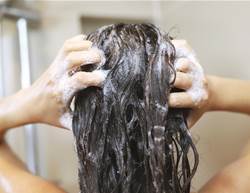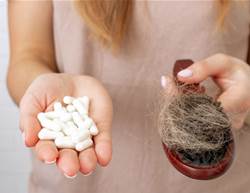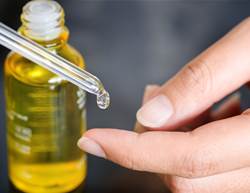It can be tricky to figure out what’s behind dry, flaky skin—especially on your scalp. If you’ve noticed flakes in your hair, understanding the difference between dandruff and dry scalp is key to finding the right fix.
“People often confuse dandruff with dry scalp because they look similar, but they have distinct causes,” says board-certified dermatologist Noah Gratch.
While both conditions share some symptoms, treatment depends on the root cause. Dry scalp is usually triggered by external factors like harsh cleansers and shampoos or internal conditions like eczema. Dandruff, on the other hand, is a symptom of seborrhoeic dermatitis, “an inflammatory skin condition that can cause itching, burning, scaling and flaking on the scalp,” explains board-certified dermatologist Heather Woolery-Lloyd.
Below, dermatologists break down the key differences between dandruff and dry scalp, how to tell them apart and the best ways to treat and prevent each condition.
Dandruff vs. dry scalp
To determine whether you’re dealing with dandruff or a dry scalp, start by looking at the appearance of your scalp and considering your symptoms.
First, check if flaking is only on your scalp or appears elsewhere. “Dandruff can also affect the eyebrows, areas around the nostrils, ears and beard,” says board-certified dermatologist Caroline N. Opene. “These are good clues that you may have seborrhoeic dermatitis.”
Next, look at the flakes themselves. If they are yellow, oily or large, dandruff is likely the culprit, says Dr Gratch. If they are small, white and accompanied by dryness on other parts of your body, a dry scalp is more likely.
Scalp inflammation and intense itching are also strong signs of dandruff, adds Dr Woolery-Lloyd, who notes that symptoms may worsen with stress. “Dry scalp may feel tight and dry but is less likely to cause itching, burning or excessive flaking,” she says.
What is dandruff?
Causes
“Dandruff is caused by an exaggerated inflammatory response to a common yeast (Malassezia) that grows on most people’s skin,” says Dr Opene. This response can be worsened by excess oil production, which may be triggered by hormones, stress or diet, adds Dr Gratch.
Symptoms
The most visible symptoms of dandruff include flakes and scales on the scalp, says Dr Woolery-Lloyd. These flakes are often yellow or white and the scalp may appear red, adds Dr Opene, who notes that itching may or may not be present.
What is dry scalp?
Causes
A dry scalp is caused by a lack of moisture and can be due to dry weather, overwashing hair, product buildup or using harsh shampoos and hair products, explains Dr Gratch. While Dr Opene notes that many people with dry scalp actually have undiagnosed dandruff (seborrhoeic dermatitis), dryness can also be linked to atopic dermatitis (eczema).
Symptoms
The most common symptoms of dry scalp include dry hair, itchiness and small white flakes, says Dr Gratch. Unlike dandruff, dry scalp flakes tend to be smaller and whiter, while dandruff flakes are often larger and more yellow.
Treatment and prevention
Dandruff
Experts agree that washing hair frequently—about every other day—is one of the best ways to manage dandruff, as opposed to dry scalp, where overwashing can worsen symptoms. Regular washing helps prevent excess oil buildup. Over-the-counter and prescription antifungal dandruff shampoos are particularly effective, says Dr Woolery-Lloyd. Look for active ingredients like zinc pyrithione, selenium sulfide, ketoconazole or salicylic acid.
Hair type can influence treatment for seborrhoeic dermatitis, says Dr Woolery-Lloyd. “For people with coily or curly hair, many over-the-counter and prescription shampoos can be very drying,” she says. In cases where frequent washing and dandruff shampoos are unsuitable, “we rely less on shampooing and may use topical anti-inflammatory medications to manage dandruff,” says Dr Opene. A doctor can help determine the best treatment for your needs.
Dry scalp
“Some simple ways to treat dry scalp include staying hydrated, washing hair less frequently, avoiding heat styling and steering clear of products with parabens, dyes and fragrances,” says Dr Gratch.
Once eczema and seborrhoeic dermatitis have been ruled out, Dr Opene recommends using moisturising shampoos and conditioners. “You can also apply a scalp treatment after washing to lock in moisture,” she says.
When to see a doctor
Experts recommend seeing a dermatologist if regular shampooing or over-the-counter treatments aren’t improving your scalp concerns.
“If you’re unsure whether you have dandruff or dry scalp, a doctor can examine your scalp, provide a diagnosis and create a treatment plan tailored to your needs,” says Dr Opene.
Dr Gratch adds that you should also seek medical advice if you experience hair loss, intense itching, burning or sores on the scalp.









